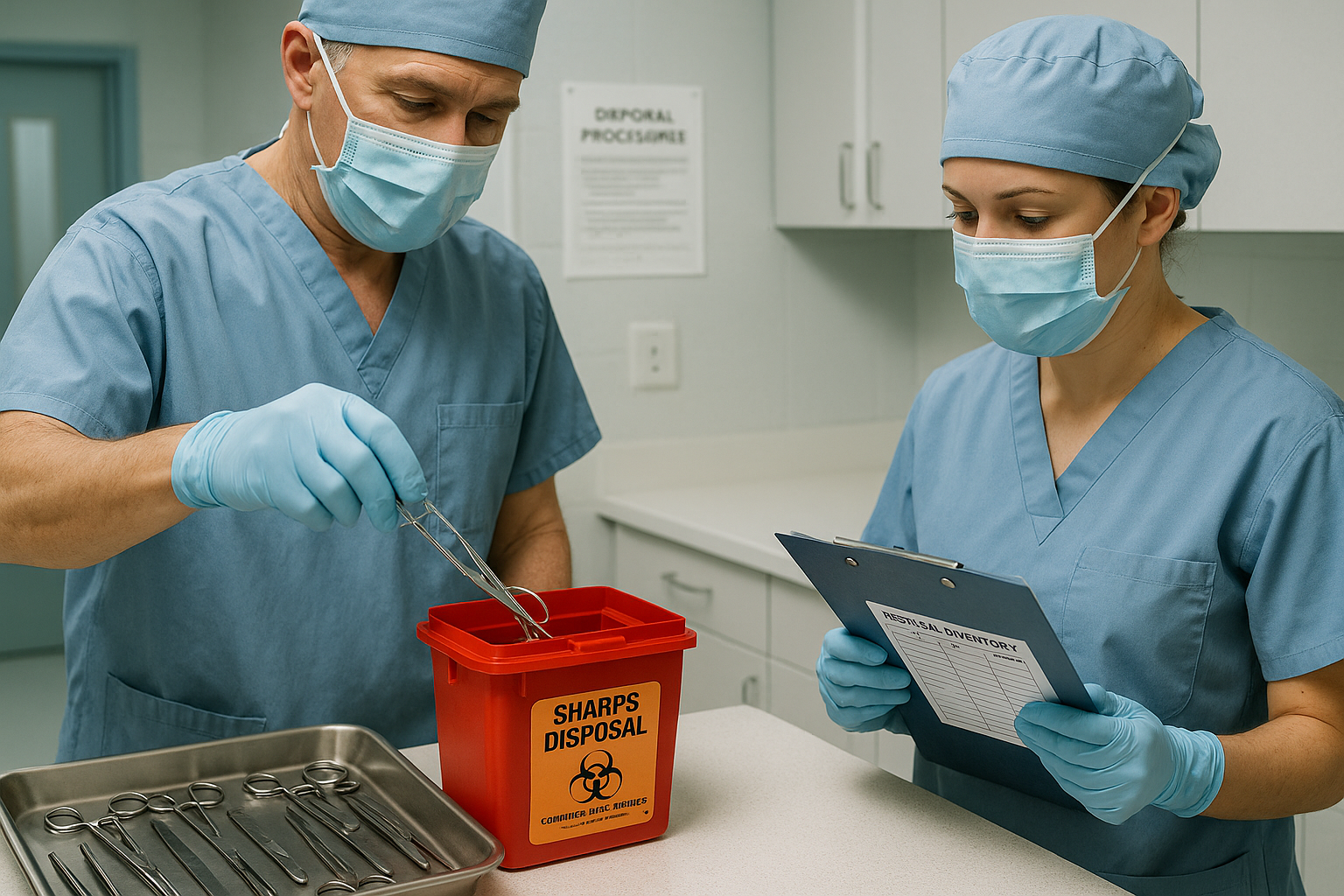In the realm of healthcare, the tools of the trade are often as critical as the hands that wield them. Surgical instruments, having served their purpose in the most delicate and life-altering procedures, inevitably reach a point where they must be retired. But what happens to these tools once their final incision has been made? The answer is both intriguing and essential for maintaining the dignity of the medical profession. 🌟
The burial of surgical tools is not merely a practical necessity; it is a practice steeped in respect, sustainability, and responsibility. As medical facilities across the globe strive to adopt greener practices, the proper disposal of surgical instruments has become a topic of significant importance. This article delves into the protocols and procedures involved in giving surgical tools the send-off they deserve, ensuring that their disposal is handled with the utmost efficiency and respect.
Our journey begins with understanding the lifecycle of a surgical instrument. From the moment a scalpel is crafted, or a pair of forceps is molded, these tools are destined to play a critical role in the operating room. Over time, however, even the most resilient instruments succumb to wear and tear. At this juncture, the decision must be made: how do we dispose of these once-indispensable tools responsibly?
Within these pages, we will explore the environmental impact of surgical tool disposal, a concern that cannot be overlooked in today’s eco-conscious society. 🌍 Improper disposal can lead to environmental hazards, posing risks to both human health and natural ecosystems. We’ll discuss strategies for minimizing these risks through recycling and reprocessing techniques that breathe new life into old instruments, transforming waste into resources.
Yet, the conversation does not end with environmental considerations. There is also a pressing need to address the ethical implications of surgical tool disposal. Medical instruments, having been involved in countless life-saving procedures, carry with them a legacy of care and precision. It is only fitting that their final disposition reflects the gravity of their service. We’ll examine the protocols that ensure these tools are handled with the dignity they deserve, respecting the confidentiality and integrity of the medical profession.
Moreover, we’ll take a closer look at the role of technology in streamlining the disposal process. Innovations in waste management and recycling technology are revolutionizing how hospitals and clinics manage their expired instruments. From automated sterilization systems to advanced recycling facilities, we’ll highlight the cutting-edge solutions that are making a difference in the way surgical tools are retired.
Finally, no discussion on the burial of surgical tools would be complete without considering the regulatory landscape. Compliance with local, national, and international regulations is crucial for any medical facility. We’ll outline the legal requirements and standards that guide the proper disposal of surgical instruments, ensuring that healthcare providers remain on the right side of the law while upholding the highest standards of practice.
By the end of this article, you will have gained a comprehensive understanding of the protocols involved in the respectful and efficient disposal of surgical tools. Whether you are a healthcare professional, an environmental advocate, or simply someone with a keen interest in medical practices, the insights shared here will equip you with the knowledge to appreciate and advocate for responsible disposal practices. Together, we can ensure that the legacy of surgical instruments is one of respect, sustainability, and continuous improvement. 🏥

Conclusion
# Conclusion: Efficient and Respectful: The Proper Protocol for the Burial of Surgical Tools
In conclusion, the article has delved into the critical protocols and practices surrounding the respectful and efficient burial of surgical tools, a subject that combines both scientific precision and cultural sensitivity. The discussion began with an overview of why proper disposal of surgical instruments is essential, touching on environmental concerns, regulatory standards, and the prevention of infection and disease transmission. As we explored these dimensions, it became clear that the disposal of surgical tools is not merely a logistical task but a vital practice that impacts public health, environmental sustainability, and ethical standards within the medical community.
## Recap of Key Points
One of the key points addressed was the importance of adhering to **regulatory standards**. These standards are designed to ensure that all medical facilities follow a unified approach to the disposal of surgical tools. This not only helps maintain a high standard of public health safety but also ensures compliance with laws that protect the environment from potential biohazards. Institutions such as the World Health Organization (WHO) and national health departments provide guidelines to assist in this process. Following these guidelines is crucial for maintaining the integrity and trust of healthcare institutions. 🌍
Another significant point of discussion was the **environmental impact** of improper disposal. Surgical tools that are not disposed of correctly can contribute to environmental pollution, including soil and water contamination. The adoption of sustainable disposal practices, such as recycling and using biodegradable materials, can significantly mitigate these negative effects. We highlighted innovative methods some hospitals are employing, such as partnerships with recycling companies and investment in sterilization technologies that allow for the safe reuse of certain tools.
The article also explored the **cultural and ethical considerations** in the disposal of surgical instruments. In many cultures, the tools used in surgery hold a significant symbolic value, and their disposal must be handled with respect to local customs and beliefs. It is crucial for healthcare providers to be aware of these cultural sensitivities to ensure that their practices do not inadvertently cause offense or distress to patients and their families. 🤝
## The Importance of the Topic
The disposal of surgical tools is a subject that, while highly technical, touches on broader themes of responsibility, ethics, and sustainability. The medical community is at the forefront of promoting health and well-being, and this extends beyond patient care to include environmental stewardship and cultural respect. By prioritizing the proper burial of surgical tools, healthcare providers can lead by example, showing a commitment to comprehensive care that respects both human and ecological health.
Furthermore, this topic is increasingly relevant in today’s world, where there is a growing emphasis on sustainable practices across all industries. The healthcare sector, in particular, has a responsibility to minimize its environmental footprint while maintaining high standards of patient care. By adopting efficient and respectful disposal protocols, medical facilities can contribute to a healthier planet and a more ethically conscious community. 🌿
## Call to Action
As we conclude, I encourage readers to reflect on the practices in their own medical institutions and consider ways in which these protocols can be enhanced or refined. Whether you are a healthcare professional, an environmental advocate, or simply an interested reader, there is always room to learn and improve. Share your thoughts and experiences in the comments section below, and let’s start a conversation on how we can collectively push for better practices in the disposal of surgical tools. 🗨️
Feel inspired to take action and share this article with colleagues and friends who might benefit from this information. By spreading awareness, we can work towards a future where the disposal of surgical tools is handled with the respect and efficiency it deserves.
For further reading and to stay updated on best practices, consider visiting the following resources:
– [World Health Organization: Safe management of wastes from health-care activities](https://www.who.int)
– [Environmental Protection Agency: Medical Waste](https://www.epa.gov)
Thank you for engaging with this important topic. Together, we can make a difference in promoting health, safety, and environmental sustainability. 🌟
Toni Santos is a researcher and practitioner specializing in the study of ancestral healing systems, energetic frameworks of the body, ancient herbal traditions, and sacred operative procedures. Through an interdisciplinary and historically-rooted lens, Toni investigates how humanity has preserved and transmitted knowledge of preventive health, subtle anatomy, plant medicine, and ritual intervention — across cultures, lineages, and sacred traditions. His work is grounded in a fascination with healing not only as physical remedy, but as carriers of hidden wisdom. From ancestral preventive health practices to energetic healing maps and ritual operative techniques, Toni uncovers the visual and symbolic tools through which cultures preserved their relationship with the body, spirit, and plant world. With a background in ethnomedical history and comparative anatomy systems, Toni blends archival research with practical study to reveal how ancient societies used plants, energy, and ceremony to shape health, transmit wisdom, and encode sacred knowledge. As the creative mind behind jirenx.com, Toni curates illustrated frameworks, historical case studies, and symbolic interpretations that revive the deep cultural ties between ancestral medicine, energetic healing, and sacred procedure. His work is a tribute to: The lost healing wisdom of Ancestral Preventive Health Practices The guarded rituals of Energetic Anatomy and Healing Maps The ancient knowledge of Herbal Pharmacology of Antiquity The layered sacred practice of Ritual Surgery and Sacred Operations Whether you're a traditional medicine scholar, energetic healer, or curious seeker of ancestral health wisdom, Toni invites you to explore the hidden roots of sacred medicine — one practice, one map, one ritual at a time.
